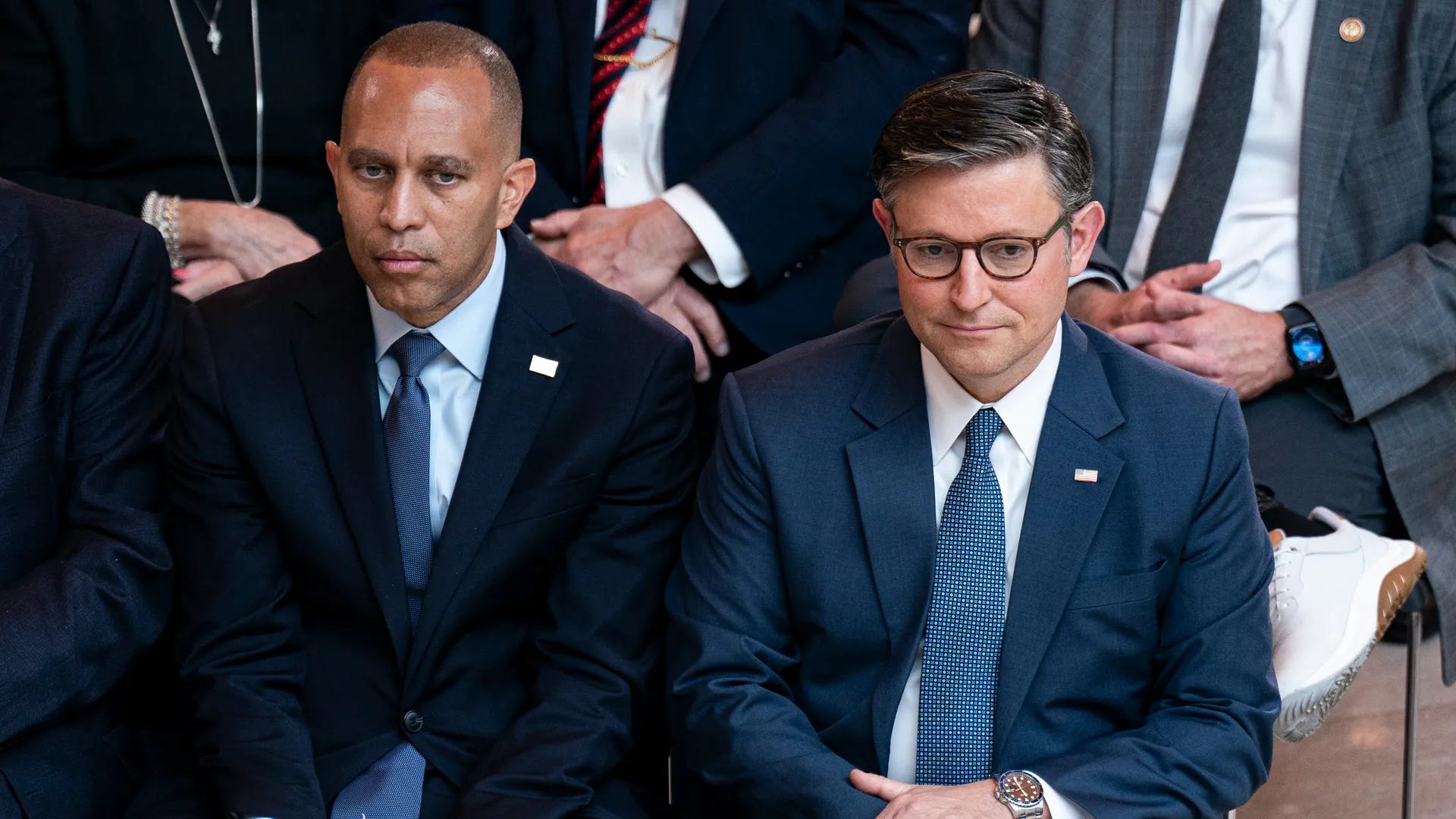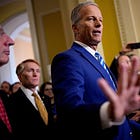Jeffries, Johnson and the politics of silence after a death threat
Plus: Senate Dems block federal worker pay bill, House Dems called back to DC next week and a top Dem senator responds to the latest sports scandal.

👋🏾 Hi, hey, hello! It’s Friday morning—and Day 24 of the government shutdown. The House has not voted in 34 days. Speaker Mike Johnson (R-La.) is expected during a non-voting session this afternoon to cancel votes next week for the fifth in a row. House Democrats have been asked by their leadership to return to Washington next week for a Tuesday caucus meeting and a series of events on Wednesday, a member told me.
The Senate adjourned for the weekend on Thursday afternoon. President Donald Trump is traveling to Asia tonight for an official trip—his second since the shutdown, following a visit to Israel after he announced the country in the Middle East and Hamas had agreed to a ceasefire in Gaza. These dynamics reinforce the sense that this thing is nowhere near a breakthrough.
In this morning’s edition, I dive deep into the status of the working relationship between House Speaker Mike Johnson (R-La.) and House Minority Leader Hakeem Jeffries (D-N.Y.) in the aftermath of the recent death threat against Jeffries and the crickets he’s heard from Johnson since. But let’s start with a few news and notes.
— The Senate failed to advance a bill sponsored by Sen. Ron Johnson (R-Wis.) that would guarantee federal workers who have to keep working during a government shutdown still receive on-time paychecks, rather than waiting until the government reopens.
Most Democrats opposed the bill because they say it gives President Trump too much discretion in deciding which workers get paid and which don’t. But Sen. John Fetterman (D-Pa.), one of the three Democrats who have voted 12 times with Republicans on the House-passed measure to extend government funding through mid-November, was joined by Jon Ossoff and Raphael Warnock—Georgia’s two Democratic senators who voted in favor of the Johnson legislation because they believe essential employees who must come work to keep the country running should be paid. The final vote was 54-45, several votes short of the 60-vote threshold to overcome a filibuster.
Sen. Chris Van Hollen (D-Md.) requested unanimous consent to pass one of two Democratic counterproposals, the first of which he sponsored and would ensure that all federal workers—including furloughed employees, contractors, and active-duty service members—receive regular pay and benefits during the ongoing government shutdown. It would also prevent agencies from implementing layoffs or extended administrative leave until funding is restored. Johnson objected to the request.
Then, Sen. Gary Peters (D-Mich.) asked for UC to pass his bill to guarantee back pay within seven days of enactment for all federal workers, contractors and active-duty service members affected by the shutdown—effectively treating the entire shutdown period as paid work time—and prohibit agencies from redirecting the funds for any other purpose. Johnson also objected to this request.
Following the vote, Johnson told reporters he remained committed to negotiating a bipartisan deal to pay federal workers during the shutdown, arguing that the only way to resolve differences with Democrats is to formally begin debate on his bill rather than rely on unanimous consent. He said he’s been in touch with Sens. Van Hollen and Peters’ staffs to try to iron out disagreements, adding that he’s willing to modify his proposal—including adding pay for furloughed employees. Johnson also maintained that both sides largely agree on the goal and should open debate on the bill to work through amending it until it has the votes to pass.
There’s discussion among Senate leadership to bring up stand-alone bills that would force Democrats into tough votes, including to fund SNAP and pay air traffic controllers, as a nutritional assistance cliff looms and government officials worry the shutdown will further exacerbate the shortage of ATCs will begin to affect travel heading into the holiday season.
— The federal government’s widening probe into illegal gambling and organized crimes reached deep into the sports world on Thursday morning, ensnaring high-profile figures and exposing how pervasive underground betting has become even as legal sports wagering explodes nationwide.
Federal prosecutors say the investigation uncovered tampered poker equipment, hidden cameras, and organized-crime ties stretching from New York to Las Vegas. But some defense attorneys and outside observers have accused the FBI of sensationalizing the NBA connection—spotlighting the arrests of prominent figures like Portland Trail Blazers coach Chauncey Billups to amplify the case’s visibility rather than its substance.
Still, the inclusion of professional sports figures underscores how vulnerable the industry remains to gambling’s shadow economy—and how urgently policymakers may soon be asked to tighten the rules in an industry that’s grown faster than its guardrails.
I asked Sen. Ron Wyden (D-Ore.), an unapologetic hoops fan who’s usually very chatty during our conversations, for his reaction to the Billups arrest.
“It’s a very sad day for us as sports fans. I’m gonna leave it that.”
— Finally, if you’re wondering what the daily grind of covering a government in gridlock has been like, then check out my latest COURIER Newsroom column. I write about what 21 days of a shutdown looks and feels like from the Hill: the locked House, the restless Senate, the daily leadership pressers, and the quiet scramble to spot any sign the stalemate might break.
And now back to the Jeffries-Johnson relationship.
Congress has faced violence before. And in those moments, its leaders have usually found a way to stand together. When then-House Majority Whip Steve Scalise (R-La.) was shot in 2017, lawmakers from both parties prayed together on the baseball field where he fell. The shooting of former Rep. Gabby Giffords (D-Ariz.) six years earlier drew bipartisan outrage and led to a rare push to bolster member safety at public events. Even after the January 6 attack, there was a fleeting sense of unity as both chambers returned to certify the election.
But since the credible death threat against Jeffries became public on Tuesday, not one Republican leader—including Speaker Johnson—has reached out to him personally in connection with the death threat and subsequent arrest of a 34-year-old man convicted for his role in the 2021 Capitol attack.
Jeffries told me he was unsurprised, though.
“Because these individuals, these extremists, are the ones—they can’t justify the fact that Donald Trump pardoned hundreds of violent felons on his first day in office, people who brutally beat police officers, including seriously injuring them on these Capitol steps,” he said. “And the Republicans, of course, as they always do, have supported that extreme action. And they just can’t simply justify the fact that they’ve put the safety and well-being of the American people in jeopardy by their reckless actions.”
Christopher P. Moynihan, a 34-year-old New Yorker, was arrested and charged this week with making a terroristic threat after prosecutors say he sent text messages vowing to kill Jeffries ahead of an appearance at in event in New York this past Monday.
Court papers quoted in media reports include alleged messages such as “Hakeem Jeffries makes a speech in a few days in NYC I cannot allow this terrorist to live” and “Even if I am hated he must be eliminated. I will kill him for the future.”
Moynihan was previously convicted for his role in the January 6 riot and had received clemency from President Trump earlier this year. Authorities said the New York State Police arrested him after an FBI tip. He was arraigned in Dutchess County.
Johnson said he was unfamiliar with the incident when asked about it on Tuesday before he condemned it.
“But anybody who threatens to kill any political official we denounce it absolutely. They ought to have justice fall upon their head,” Johnson said. “We denounce violence from anybody, anytime. Those people should be arrested and tried.”
The incident comes as Jeffries and Johnson have called on lawmakers to demonstrate civility in an environment that many view as unsustainable due to the sharp rise in threats and acts of political violence.
When Jeffries was elected as the top House Democrat in 2023, his counterpart was Kevin McCarthy, a California Republican who’d finally reached his personal summit after becoming House Speaker following a brutal 15-round series of floor votes that required him to make all sorts of concessions to his conservative flank in exchange for their tepid support.
McCarthy’s troubles stemmed from the very deals that secured his gavel. The policy and procedural concessions he made to hard-right members during the marathon speaker vote quickly boxed him in. When he later struck a bipartisan debt-ceiling agreement with former President Joe Biden and relied on Democratic votes to avert a shutdown, conservatives accused him of breaking his word.
The result was a steady erosion of trust inside his own ranks—one that left him too weakened to lead or negotiate with Jeffries on equal footing. Once McCarthy’s credibility came into question, it ultimately undermined his ability to maintain an integral relationship with Jeffries, due to his own struggles within his conference.
After Democrats joined eight Republicans in crowning McCarthy with the first distinction of becoming the first speaker to be removed from the role during a legislative session nine months after he received the gavel, Johnson emerged as a consensus pick following weeks of GOP infighting to choose the conference’s next leader.
Jeffries and Johnson have since both described their relationship as cordial and productive. Similarly to during the McCarthy era, I’m told there is a spoken understanding that both sides never personalize their remarks or criticisms of the other. But that restraint has been increasingly tested in Trump’s second term. The House GOP conference now mirrors his combative instincts and accepts his demands for ideological purity, while Democrats—shut out of power—are under pressure from a weary base that has demanded sharper, more aggressive messaging from their leaders.
Since Trump’s rise to power, the nation has seen a sharp increase in politically motivated violence targeting figures from both parties. The 2022 attack on Paul Pelosi, the husband of then-Speaker Nancy Pelosi, shocked the country when an assailant broke into their San Francisco home searching for the Democratic leader. Trump himself has survived multiple assassination attempts before returning to the White House. At the same time, violent incidents have also struck at the state level—including the killing of two Minnesota state lawmakers earlier this year—and extended to right-wing figures such as conservative commentator Charlie Kirk.
U.S. Capitol Police reported in February that its Threat Assessment Section investigated 9,474 “concerning statements and direct threats” against members of Congress, their families and staff in 2024—up from 8,008 in 2023 and 7,501 in 2022. The number is only slightly below the 2021 peak of 9,625 cases. According to the department, the uptick occurred in an election year and reflects threats made via mail, email, telephone, social media and other online platforms.
Most rank-and-file House Democrats I spoke to for this story, who were granted anonymity in exchange for their candor, view Jeffries as a leader with the proper temperament to remain unfazed by the lack of Republican outreach, especially amid the specter of the second-longest shutdown in American history.
One member told me they respected Jeffries for taking Johnson seriously, even though they viewed the speaker as one of the weakest in history since most of his standing within the GOP conference derives from Trump’s blessing.
Another said that while members may quibble with a leadership decision here or there, they trust Jeffries to focus on the issues and message that will help Democrats snatch back the gavels from Johnson and Republicans next year.
“He’s a serious person in that he doesn’t allow emotion to cloud his judgment and doesn’t take personally the moves of the other side,” a source close to Jeffries added.
Several spokespeople for the speaker did not respond to requests for comment.
Trump—who, in the years Jeffries has served in senior House Democratic leadership, had yet to refer to him by name and has taken to trolling Jeffries and Senate Minority Leader Chuck Schumer (D-N.Y.) during the current government funding lapse and in the weeks leading up to it—on Thursday dismissed any suggestion that him pardoning hundreds of January 6 defendants on his first day back in office might have emboldened extremists when he was asked about the arrest of a man accused of threatening to kill Jeffries.
“You have thousands of people that we’re dealing with, and, you know, if one goes haywire…” he said, before pivoting to a false comparison involving a Jay Jones, the embattled Democratic candidate for Attorney General in Virginia. “I don’t know of the incident,” Trump added, insisting he was “very proud” of the pardons and calling his party “too nice” for not taking a harder line against Democrats.
The exchange underscored the extent to which Trump’s posture toward political violence has shaped the environment on Capitol Hill. Rather than condemning the threat or expressing solidarity with Jeffries, the president cast himself as a victim of “dirty cops” and partisan double standards—rhetoric that echoed the same grievance politics fueling his decision to rebuff Democrats’ requests to negotiate a solution to reopen the government as the impasse drags on.
A spokesperson for Jeffries did not respond to a request for comment on Trump’s remarks.
Jeffries, for his part, didn’t directly respond when I asked if Johnson’s silence signaled a waning relationship between the two leaders.
“The most important issues for us here in the Congress is to address the quality-of-life issues for the American people,” he said. “We need to drive down the high cost of living, and we remain committed to finding a bipartisan path toward doing that in the context of this spending agreement. And of course, we have to decisively address the Republican healthcare crisis.”
Jeffries accused Trump and congressional Republicans of breaking their promise to lower costs, saying prices for housing, electricity and groceries have continued to climb under their watch. He blamed Trump’s tariffs and GOP inaction for rising health care costs, mocking the president’s priorities and characterizing the Republican agenda as one that can find billions for Argentina bailouts but not to extend Affordable Care Act tax credits for working families—a core demand for Democrats to put up the votes to reopen the government.
“For us, this moment is all about the American people,” he said. “The whole thing is a disgrace—and the American people see it.”



